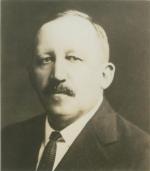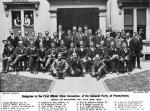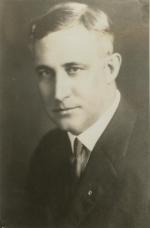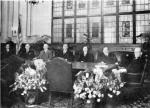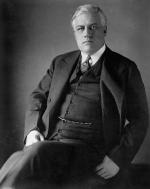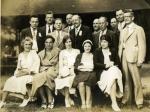![header=[Marker Text] body=[Labor leader and advocate for child labor reform, pensions, and the state's first workers" compensation act. Self-educated, Maurer was elected president of the Pennsylvania Federation of Labor from 1912-1928. He served as state legislator from Reading as a Socialist (1910-1918). He ran unsuccessfully for vice president of the United States on the Socialist ticket in 1928 and 1932. He was a lifelong Reading resident] sign](http://explorepahistory.com/kora/files/1/10/1-A-343-139-ExplorePAHistory-a0l3j9-a_450.gif)
Mouse over for marker text
Name:
James Maurer (1864-1944)
Region:
Hershey/Gettysburg/Dutch Country Region
County:
Berks
Marker Location:
Heritage Park near Workers' Memorial, 8th and Canal Sts., Reading
Dedication Date:
August 8, 2005
Behind the Marker
What city in Pennsylvania ran five presidential and vice-presidential candidates between 1928 and 1956? The answer is Reading: in 1928 and 1932, James Maurer was Socialist Norman Thomas' running mate, as was Darlington Hoopes in 1944. In 1952 and 1956 Hoopes was the party's standard bearer. Although the Socialist candidate never polled more than 885,000 - and only 2 percent of the total in the presidential election of 1932 when the country was in the depth of the Great Depression–the Socialist presence in Reading in the early decades of the twentieth century was not all that uncommon. Indeed, more than seventy cities, including New York, Philadelphia, Milwaukee, and Chicago, elected Socialist mayors, state legislators, and city councilors.
In the late 1800s, significant numbers of farmers and industrial workers were deeply unhappy with what they viewed as their victimization by America's unregulated free market system, the growing concentration of "predatory wealth," and business's control of both the Republican and Democratic parties. So they turned to third parties for representation: the Greenback Party in the 1870s, Populists in the 1890s, and the Socialist and Progressive parties in the early 1900s.
Organized in 1901, the Socialist Party of America advocated the transfer, through revolution if necessary, of the control of critical industries from private enterprise to the American people and their representatives, the government. Between 1900 and 1920 Illinois labor leader Eugene V. Debs ran for president five times on the Socialist Party ticket, and in 1912 won almost 900,000 votes.
With a large population of German Americans and eastern European miners and industrial workers, northeastern Pennsylvania was a stronghold of political outsiders. In the 1880s, the citizens of Scranton elected a tough talking labor organizer, Knights of Labor president Terence Powderly as mayor.
Terence Powderly as mayor.
Between the 1910s and 1940s the Socialist party was a powerful force in City of Reading. In the 1910s, the voters of Reading three times elected Socialist James Maurer to the Pennsylvania legislature. In 1927, and then again in 1935 and 1943, they elected Socialist J. Henry Stump as their mayor.
Born in 1864, Maurer was just ten when his father died. Forced to go to work, he only learned to read at age sixteen when a Knights of Labor organizer taught him while they were working in a machine shop. Maurer joined the Knights in 1880, and when blacklisted for his union membership went into business with his brothers as a steamfitter and machinist, then lost everything in the depression of the 1890s.
Joining the growing number of working-class Americans who were radicalized by the events of the late 1800s, Maurer joined the Socialist Party of America soon after its organization in 1901 and at once began organizing in Reading. A mid-sized city of mixed industries, Reading was ripe ground for political change, for it had a large ethnically German population, a middle class dependent on workers' purchases, and political leaders noted for their corruption.
Elected in 1910 to the state house of representatives on the Socialist party ticket, Maurer wasted no time making his presence felt in Harrisburg. He immediately initiated an investigation of the Pennsylvanian State Police, which during their suppression of recent strikes of Philadelphia transit workers and Westmoreland County coal miners had acquired a reputation for brutality. Maurer then introduced the 1915
Pennsylvanian State Police, which during their suppression of recent strikes of Philadelphia transit workers and Westmoreland County coal miners had acquired a reputation for brutality. Maurer then introduced the 1915  state workman's compensation law, one of the most ambitious and controversial pieces of state legislation introduced during the Progressive era.
state workman's compensation law, one of the most ambitious and controversial pieces of state legislation introduced during the Progressive era.
Following his first term in the legislature, during which he learned how lawmaking was actually conducted, Maurer became the state's principal spokesman for Pennsylvania's industrial workers after his election as president of the Pennsylvania Federation of Labor (PFL), which backed labor candidates regardless of party affiliation.
how lawmaking was actually conducted, Maurer became the state's principal spokesman for Pennsylvania's industrial workers after his election as president of the Pennsylvania Federation of Labor (PFL), which backed labor candidates regardless of party affiliation.
During World War I, Maurer and other Socialist leaders took a strong anti-war stance. In 1918, he avoided arrest and incarceration for sedition only when the PFL re-elected him as president. (A Secret Service Agent had been ordered not to arrest him if he won, for fear that Pennsylvania workers would refuse to contribute to war production.)
His leadership of the national Socialist party, however, afforded no such protection to party leader Eugene V. Debs. After making a speech in Canton, Ohio, on June 16, 1918, in which he criticized the Espionage Act, Debs was arrested and sentenced to ten years in Atlanta Penitentiary for his opposition to the war. He was still in prison when as the presidential candidate of the Socialist Party, he received 919,799 votes in 1920.
During the Red Scare of 1919-20, Maurer led the PFL in denouncing the illegal raids and arrests of labor union headquarters and leaders ordered by Attorney General A. Mitchell Palmer, a former Pennsylvanian congressman who had once been a champion of organized labor, and Governor William Sproul. "Patriots" demanded that the American-born Maurer be either deported - which was impossible - or imprisoned. Undeterred, Maurer in 1921 became the first director of the Workers' Education Bureau, a new national organization committed to promoting unionism.
General A. Mitchell Palmer, a former Pennsylvanian congressman who had once been a champion of organized labor, and Governor William Sproul. "Patriots" demanded that the American-born Maurer be either deported - which was impossible - or imprisoned. Undeterred, Maurer in 1921 became the first director of the Workers' Education Bureau, a new national organization committed to promoting unionism.
The union movement faced stiff opposition in Pennsylvania during the 1920s, but Maurer built up the PFL to some 400,000 workers by 1928, and continued to lobby for increased workers' compensation, old age pensions, and an end to child labor. In 1928 he retired from the PFL and ran for vice-president with Norman Thomas on the Socialist Party ticket. Two years later he ran on the Socialist ticket for Governor of Pennsylvania.
The Great Depression energized third-party movements led by Louisiana governor Huey Long, novelist Upton Sinclair, radio priest Father Charles Coughlin, California doctor Francis Everett Townsend, and others. The American Communist Party, newly formed American Nazi Bund, and other radical parties did their best to attract voters.
When Norman Thomas ran for president on the Socialist Party ticket in 1932, with Maurer again as his running mate, he won almost 885,000 votes, up from 267,000 in 1928. The party, however, was never able to make significant inroads with industrial workers in Pennsylvania or the nation. In 1934, Maurer made an unsuccessful run for the Senate. Two years later he resigned from the Socialist Party's executive council when most of its members endorsed Franklin Roosevelt in his bid for re-election.
In the 1930s Reading remained a stronghold of American socialism. Reading Socialist Darlington Hoopes (1896 -1989) served three terms in the Pennsylvania House of Representatives from 1930 to 1936, and then as City Solicitor of Reading from 1936 to 1940. Hoopes replaced Maurer as Norman Thomas's running mate during the presidential election of 1944, and in 1952, when the nation was in the midst of a second Red Scare, succeeded Thomas as the Socialists' presidential candidate. Four years later, the Socialist Party did not appear on the national ballot for the first time since 1900.
During the 1930s, Maurer, now in his seventies, wrote his autobiography, It Can Be Done: The Autobiography of James Hudson Maurer (1938), a fascinating story filled with the life events that had radicalized his politics and shaped his social philosophy. James Maurer died in 1944 at the age of eighty.
social philosophy. James Maurer died in 1944 at the age of eighty.
In the late 1800s, significant numbers of farmers and industrial workers were deeply unhappy with what they viewed as their victimization by America's unregulated free market system, the growing concentration of "predatory wealth," and business's control of both the Republican and Democratic parties. So they turned to third parties for representation: the Greenback Party in the 1870s, Populists in the 1890s, and the Socialist and Progressive parties in the early 1900s.
Organized in 1901, the Socialist Party of America advocated the transfer, through revolution if necessary, of the control of critical industries from private enterprise to the American people and their representatives, the government. Between 1900 and 1920 Illinois labor leader Eugene V. Debs ran for president five times on the Socialist Party ticket, and in 1912 won almost 900,000 votes.
With a large population of German Americans and eastern European miners and industrial workers, northeastern Pennsylvania was a stronghold of political outsiders. In the 1880s, the citizens of Scranton elected a tough talking labor organizer, Knights of Labor president
Between the 1910s and 1940s the Socialist party was a powerful force in City of Reading. In the 1910s, the voters of Reading three times elected Socialist James Maurer to the Pennsylvania legislature. In 1927, and then again in 1935 and 1943, they elected Socialist J. Henry Stump as their mayor.
Born in 1864, Maurer was just ten when his father died. Forced to go to work, he only learned to read at age sixteen when a Knights of Labor organizer taught him while they were working in a machine shop. Maurer joined the Knights in 1880, and when blacklisted for his union membership went into business with his brothers as a steamfitter and machinist, then lost everything in the depression of the 1890s.
Joining the growing number of working-class Americans who were radicalized by the events of the late 1800s, Maurer joined the Socialist Party of America soon after its organization in 1901 and at once began organizing in Reading. A mid-sized city of mixed industries, Reading was ripe ground for political change, for it had a large ethnically German population, a middle class dependent on workers' purchases, and political leaders noted for their corruption.
Elected in 1910 to the state house of representatives on the Socialist party ticket, Maurer wasted no time making his presence felt in Harrisburg. He immediately initiated an investigation of the
Following his first term in the legislature, during which he learned
During World War I, Maurer and other Socialist leaders took a strong anti-war stance. In 1918, he avoided arrest and incarceration for sedition only when the PFL re-elected him as president. (A Secret Service Agent had been ordered not to arrest him if he won, for fear that Pennsylvania workers would refuse to contribute to war production.)
His leadership of the national Socialist party, however, afforded no such protection to party leader Eugene V. Debs. After making a speech in Canton, Ohio, on June 16, 1918, in which he criticized the Espionage Act, Debs was arrested and sentenced to ten years in Atlanta Penitentiary for his opposition to the war. He was still in prison when as the presidential candidate of the Socialist Party, he received 919,799 votes in 1920.
During the Red Scare of 1919-20, Maurer led the PFL in denouncing the illegal raids and arrests of labor union headquarters and leaders ordered by Attorney
The union movement faced stiff opposition in Pennsylvania during the 1920s, but Maurer built up the PFL to some 400,000 workers by 1928, and continued to lobby for increased workers' compensation, old age pensions, and an end to child labor. In 1928 he retired from the PFL and ran for vice-president with Norman Thomas on the Socialist Party ticket. Two years later he ran on the Socialist ticket for Governor of Pennsylvania.
The Great Depression energized third-party movements led by Louisiana governor Huey Long, novelist Upton Sinclair, radio priest Father Charles Coughlin, California doctor Francis Everett Townsend, and others. The American Communist Party, newly formed American Nazi Bund, and other radical parties did their best to attract voters.
When Norman Thomas ran for president on the Socialist Party ticket in 1932, with Maurer again as his running mate, he won almost 885,000 votes, up from 267,000 in 1928. The party, however, was never able to make significant inroads with industrial workers in Pennsylvania or the nation. In 1934, Maurer made an unsuccessful run for the Senate. Two years later he resigned from the Socialist Party's executive council when most of its members endorsed Franklin Roosevelt in his bid for re-election.
In the 1930s Reading remained a stronghold of American socialism. Reading Socialist Darlington Hoopes (1896 -1989) served three terms in the Pennsylvania House of Representatives from 1930 to 1936, and then as City Solicitor of Reading from 1936 to 1940. Hoopes replaced Maurer as Norman Thomas's running mate during the presidential election of 1944, and in 1952, when the nation was in the midst of a second Red Scare, succeeded Thomas as the Socialists' presidential candidate. Four years later, the Socialist Party did not appear on the national ballot for the first time since 1900.
During the 1930s, Maurer, now in his seventies, wrote his autobiography, It Can Be Done: The Autobiography of James Hudson Maurer (1938), a fascinating story filled with the life events that had radicalized his politics and shaped his
Beyond the Marker




